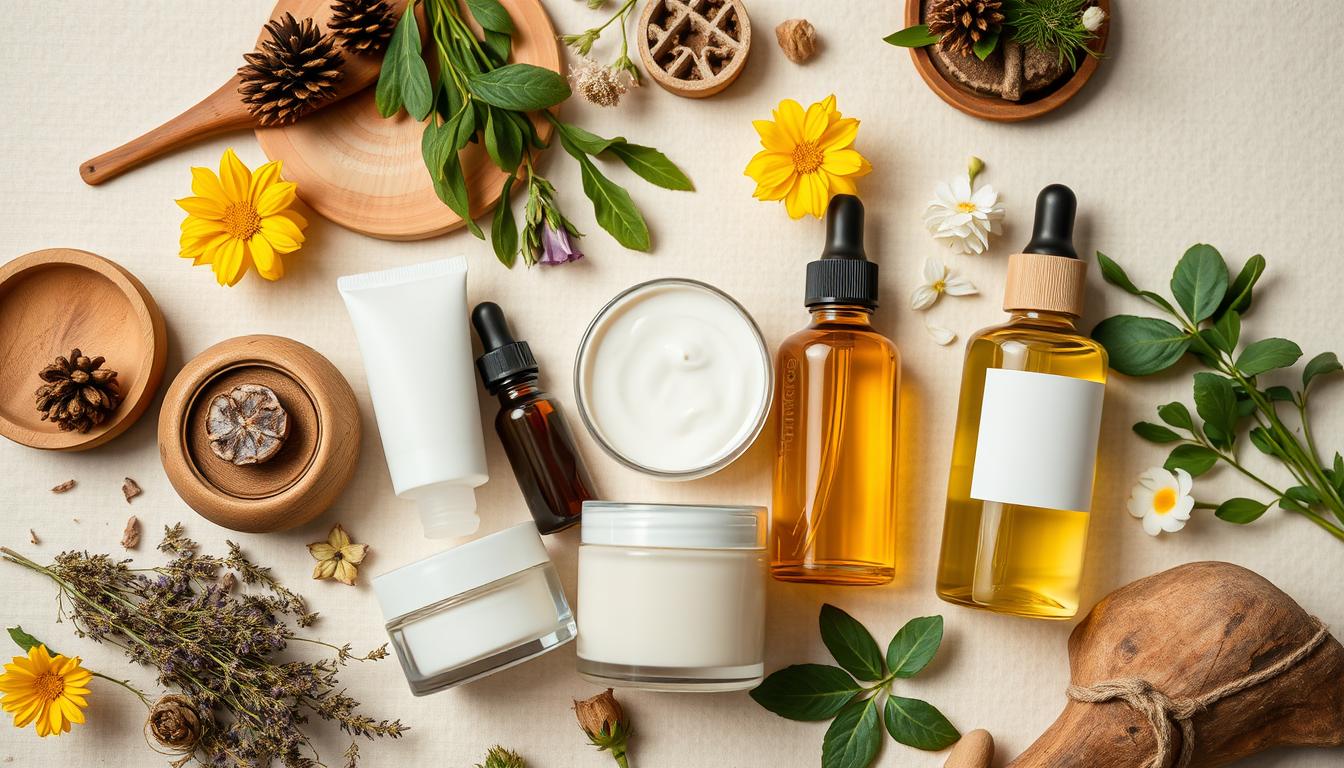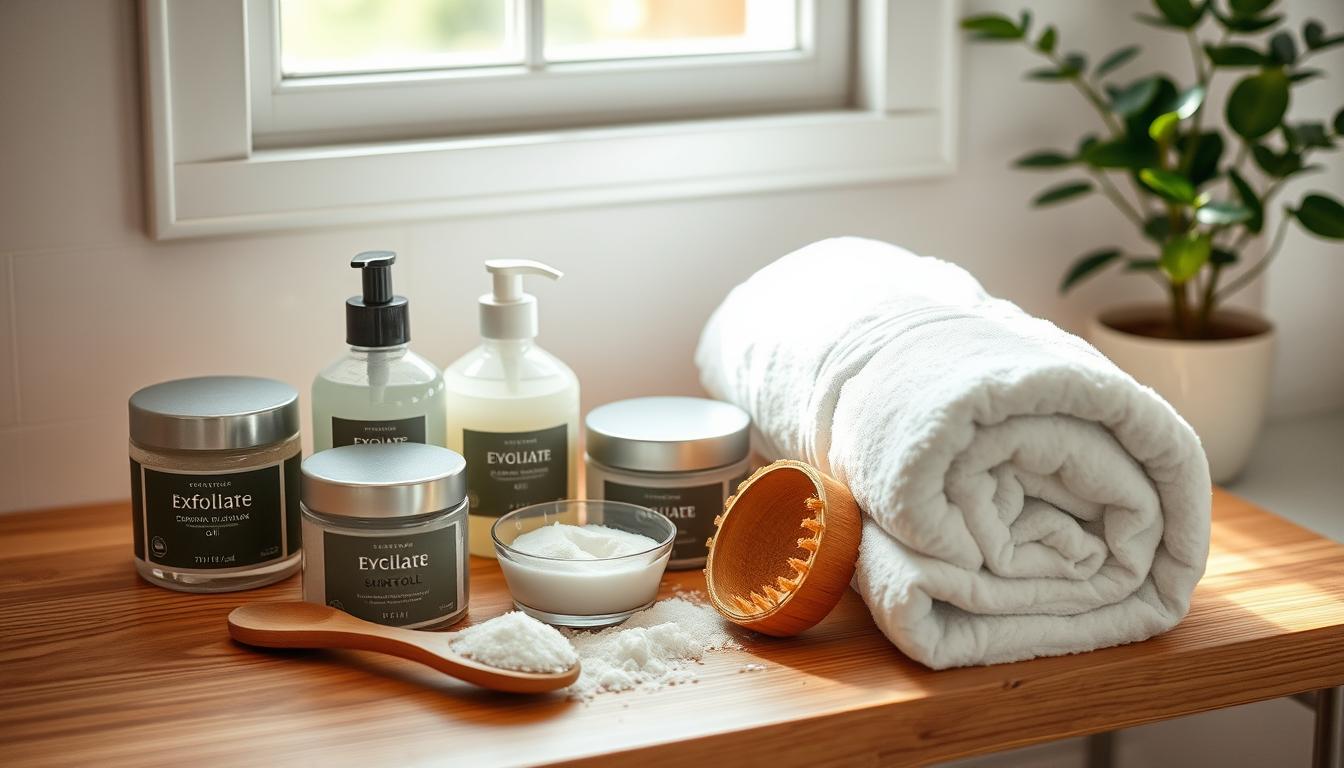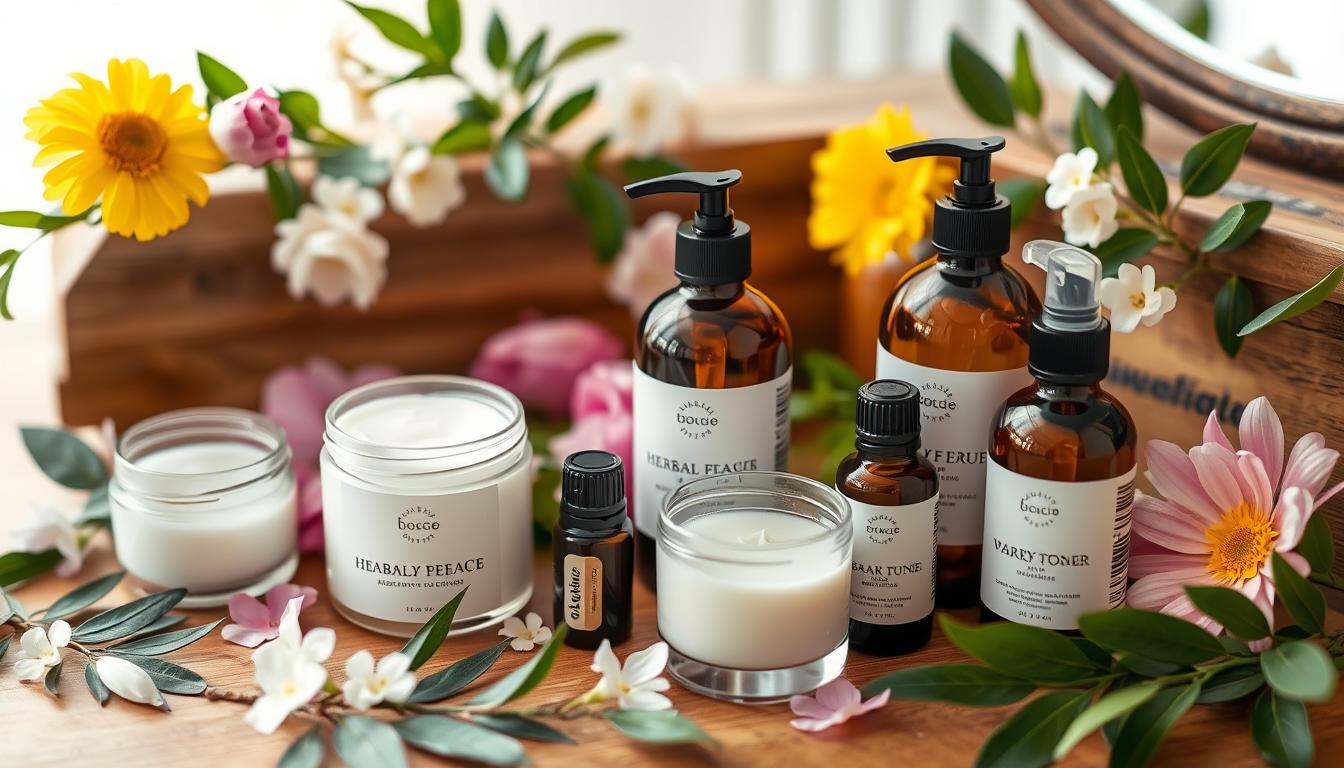The world of beauty and wellness is always changing. More and more people want natural and organic skincare. They look for brands that use clean, sustainable, and ethical ingredients.
If you want to change up your skincare routine or just add some organic products, this guide is for you. It will show you the best natural and organic skincare brands to try.
Key Takeaways
- Discover the top-rated organic skincare brands that are transforming the beauty industry.
- Understand the benefits of using organic skincare products, including healthier skin and a reduced environmental impact.
- Learn how to identify and choose the right organic skincare brand for your specific skin type and concerns.
- Explore specialized organic products, from moisturizers and facial oils to sunscreens and more.
- Gain insights on the role of ingredients in organic skincare and how to navigate the ever-growing market.
What Are Organic Skincare Brands?
In the world of beauty, organic skincare brands are becoming more popular. They use natural ingredients that are good for your skin and the planet. As more people look for plant-based skincare and eco-friendly beauty, it’s key to know what organic skincare is and why certifications matter.
Defining Organic Skincare
Organic skincare means products made without synthetic chemicals or pesticides. They come from natural sources like plants and minerals. These products aim to care for your skin and protect the environment.
The Importance of Certification
Certifications like USDA Organic, COSMOS, and EcoCert are vital. They check if organic skincare brands really are organic. This gives you peace of mind that you’re buying genuine, high-quality plant-based skincare.
| Certification | Description |
|---|---|
| USDA Organic | The United States Department of Agriculture’s organic certification, requiring at least 95% organic ingredients. |
| COSMOS | The Organic and Natural Cosmetic Standard, a European certification for natural and organic cosmetics. |
| EcoCert | A French certification that ensures a minimum of 95% of the total ingredients are of natural origin. |
Choosing organic skincare brands with these certifications means you’re making a sustainable choice. You’re caring for your skin and the planet.
Key Benefits of Using Organic Skincare
More people are choosing organic skincare for their skin and the planet. It offers many benefits, like healthier skin and less harm to the environment. It also supports ethical practices.
Healthier Skin
Organic skincare uses natural ingredients that are kind to your skin. It avoids harsh chemicals found in regular products. This leads to better skin health, less irritation, and a glowing look.
Environmental Impact
Natural beauty products and green beauty brands aim to be eco-friendly. They use ingredients and packaging that are good for the planet. Choosing sustainable skincare brands helps make your routine better for the environment.
Ethical Considerations
Many organic skincare brands focus on fairness and kindness. They follow fair trade, cruelty-free, and vegan standards. Supporting these brands helps your skin and the people and planet involved in making your products.
Switching to organic skincare can change your beauty routine for the better. It’s a way to care for your skin and help the world at the same time.
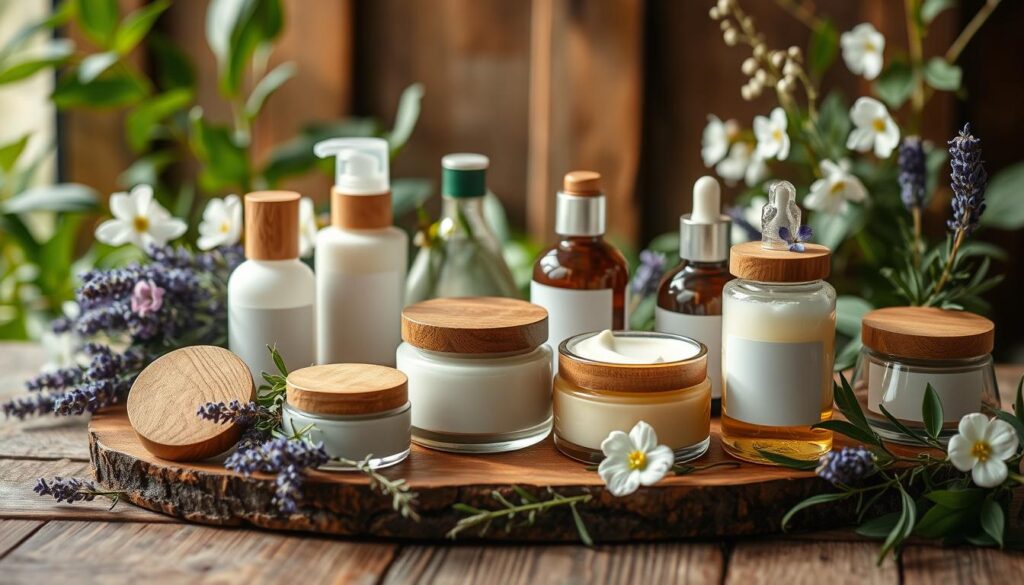
Top Organic Skincare Brands to Discover Today
In the world of organic skincare, some brands stand out. They offer natural products that meet the demand for clean beauty. Let’s look at three top brands to discover.
Tata Harper: Luxury Organic Skincare
Tata Harper is a well-known brand in organic skincare. It was founded by Tata Harper herself. The brand uses only the best organic, natural, and non-toxic ingredients.
They have products like the Resurfacing Mask and Moisturizing Hyaluronic Essence. These are known for their great performance and pampering feel.
Drunk Elephant: Clean Clinical Skincare
Drunk Elephant is a big name in organic skincare. It’s known for its clean, clinical-grade products. The brand uses only the best, non-toxic ingredients.
They avoid the “Suspicious 6” – essential oils, dyes, silicones, chemical screens, fragrance, and SLS. Drunk Elephant has a wide range of products for different skin concerns. It’s loved for its effectiveness and focus on skin health.
Herbivore Botanicals: Vegan and Cruelty-Free Skincare
Herbivore Botanicals is a favorite for its vegan and cruelty-free products. It uses pure, plant-based ingredients. They offer a variety of products, like the Jade Facial Roller and Phoenix Facial Oil.
Herbivore Botanicals focuses on botanical extracts and essential oils. It’s perfect for those who want natural, sustainable, and skin-loving options.
Tata Harper, Drunk Elephant, and Herbivore Botanicals are leaders in organic skincare. They offer a wide range of high-quality, organic, and eco-friendly products.
Specialized Organic Skincare Products
The natural beauty industry is booming. People are looking for organic skincare that meets their needs. There are many options, from moisturizers to sunscreens, all made from plants.
Organic Moisturizers
Moisturizers are key in plant-based skincare. They hydrate and protect the skin with natural ingredients. Ingredients like shea butter and aloe vera are popular. They keep the skin soft and balanced.
Organic Facial Oils
Facial oils are now a big part of skincare routines. They are made from plant oils that nourish and revitalize the skin. There’s an oil for every skin type, like marula oil for antioxidants.
Organic Sunscreens
Sun protection is essential in clean beauty. Organic sunscreens use zinc oxide or titanium dioxide for protection. They also have ingredients like aloe vera to soothe the skin.
| Product Category | Key Ingredients | Benefits |
|---|---|---|
| Organic Moisturizers | Shea butter, aloe vera, argan oil | Hydration, nourishment, skin balance |
| Organic Facial Oils | Marula oil, chamomile oil, rosehip seed oil | Rejuvenation, antioxidant protection, skin-nourishing |
| Organic Sunscreens | Zinc oxide, titanium dioxide, aloe vera, green tea | Broad-spectrum UV protection, skin soothing, hydration |
Using these organic products can make your skin healthier and more radiant. They are all about natural beauty and plant-based care.
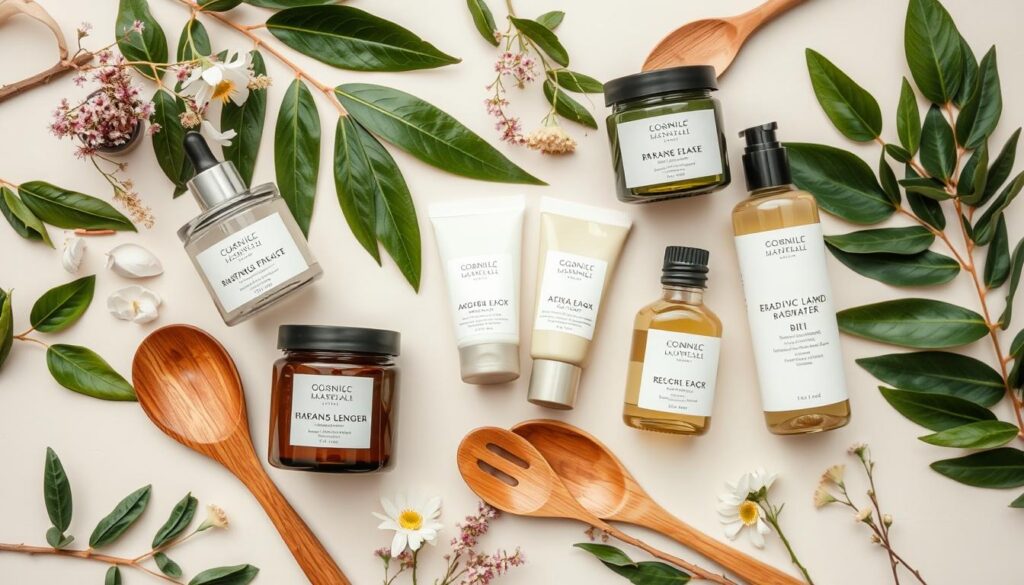
Organic Skincare for Different Skin Types
Everyone’s skin is different, and what works for one might not work for another. You need organic skincare that fits your skin type. Let’s look at the top brands for oily, dry, and sensitive skin.
Oily Skin Solutions
For oily skin, look for products that control shine and balance your skin. Tata Harper has oil-free moisturizers and clay cleansers that purify without drying out your skin. Herbivore Botanicals offers products like the Jade Facial Roller to reduce pores.
Dry Skin Essentials
For dry skin, choose brands that focus on hydration. Drunk Elephant is famous for their Lala Retro Whipped Cream, a moisturizer that’s both rich and light. OSEA has facial oils and serums that moisturize and lock in hydration.
Sensitive Skin Friendly Brands
- Eminence Organic Skin Care is great for sensitive skin. Their products use soothing ingredients like aloe vera and chamomile to calm irritation.
- REN Clean Skincare offers vegan, cruelty-free products that are free from harsh chemicals and fragrances.
- Pai Skincare is known for their sensitive-friendly range of products. They use certified organic, plant-based ingredients.
Exploring organic skincare can change your skin for the better. By choosing the right products for your skin, you can get a healthier, glowing complexion.
How to Choose the Right Organic Skincare Brand
Finding the right organic skincare brand can change your skin game. With so many options, it’s key to look at a few important things. This will help you pick a brand that fits your needs and values. Let’s dive into what to look for in the perfect organic skincare brand for you.
Ingredient Transparency
Transparency about ingredients is crucial when choosing a brand. Look for brands that clearly state where and how they source their ingredients. Stay away from brands that don’t clearly label their products. The best brands are open about what’s in their products.
Brand Reputation
The reputation of a brand can tell you a lot about its quality. Check the brand’s history, certifications, and what customers say. A brand with a good reputation and a history of safe, effective products is a smart choice for your skin.
Customer Reviews
Customer reviews are a great way to learn about a brand. Look for feedback on how well the products work, the quality of ingredients, and customer service. Pay attention to common themes or concerns. This will help you choose the best brand for your natural beauty products, clean beauty, and sustainable skincare brands.
By focusing on transparency, reputation, and customer feedback, you’ll find the right organic skincare brand. This brand will meet your skin’s needs and match your values. Make an informed choice for healthier, more radiant skin.
The Role of Ingredients in Organic Skincare
Understanding the role of ingredients in plant-based skincare, eco-friendly beauty, and green beauty is key. Let’s explore the world of organic skincare together. We’ll look at common natural ingredients, ingredients to avoid, and how to read product labels.
Common Natural Ingredients
Organic plant-based skincare brands use many natural ingredients. These ingredients help nourish and rejuvenate the skin. Some of the most common include:
- Aloe vera: Calming and hydrating properties
- Shea butter: Rich in fatty acids to moisturize and soften skin
- Botanical oils (e.g., jojoba, argan, rosehip): Packed with antioxidants and essential fatty acids
- Essential oils (e.g., lavender, chamomile, tea tree): Offer therapeutic benefits for the skin
- Vitamin C: Brightens and evens skin tone
- Green tea: Powerful antioxidant properties
Ingredients to Avoid
When exploring eco-friendly beauty, avoid certain ingredients. These ingredients can be harsh or harmful. Some to avoid include:
- Parabens: Preservatives linked to hormone disruption
- Synthetic fragrances: Can irritate sensitive skin
- Sulfates: Harsh detergents that can strip the skin’s natural oils
- Phthalates: Chemicals that can disrupt the endocrine system
- Mineral oils: Can clog pores and prevent skin from breathing
Understanding Labels
Understanding product labels is crucial in green beauty. Look for certifications like USDA Organic, Ecocert, or COSMOS. These indicate the product meets high standards for organic and natural ingredients. Also, check the ingredient list. Choose products with a shorter list of natural components.
| Ingredient | Benefit | Organic Skincare Example |
|---|---|---|
| Aloe Vera | Calming and hydrating | Tata Harper Hydrating Floral Mask |
| Vitamin C | Brightens and evens skin tone | Drunk Elephant C-Firma Day Serum |
| Green Tea | Powerful antioxidant properties | Herbivore Botanicals Jade Facial Roller |
“Embracing organic skincare is not just a beauty trend—it’s a thoughtful choice that can have a profound impact on your skin and the environment.”
DIY Organic Skincare: Is It Worth It?
Many people are trying DIY organic skincare to find natural beauty products. But is it worth the effort? Let’s look at the benefits, popular recipes, and things to watch out for when making your own eco-friendly beauty products.
Benefits of DIY Products
Making your own organic skincare has many benefits. You can choose ingredients without harsh chemicals or synthetic additives. This makes your skincare gentler and more natural. Plus, you can tailor your products to your skin’s needs, like hydration or anti-aging.
Popular DIY Recipes
- Nourishing Honey and Oat Facial Cleanser
- Soothing Rose Petal and Chamomile Toner
- Revitalizing Vitamin C and Turmeric Face Mask
- Hydrating Aloe Vera and Jojoba Face Serum
Precautions to Take
DIY organic skincare is tempting, but be careful. Make sure you know the natural ingredients you’re using. This helps avoid skin irritations or reactions. Also, keep your products clean and sterilized to stop bacteria from growing.
DIY organic skincare can be rewarding, but it needs careful attention. Weighing the benefits and precautions helps decide if it fits your natural beauty goals.
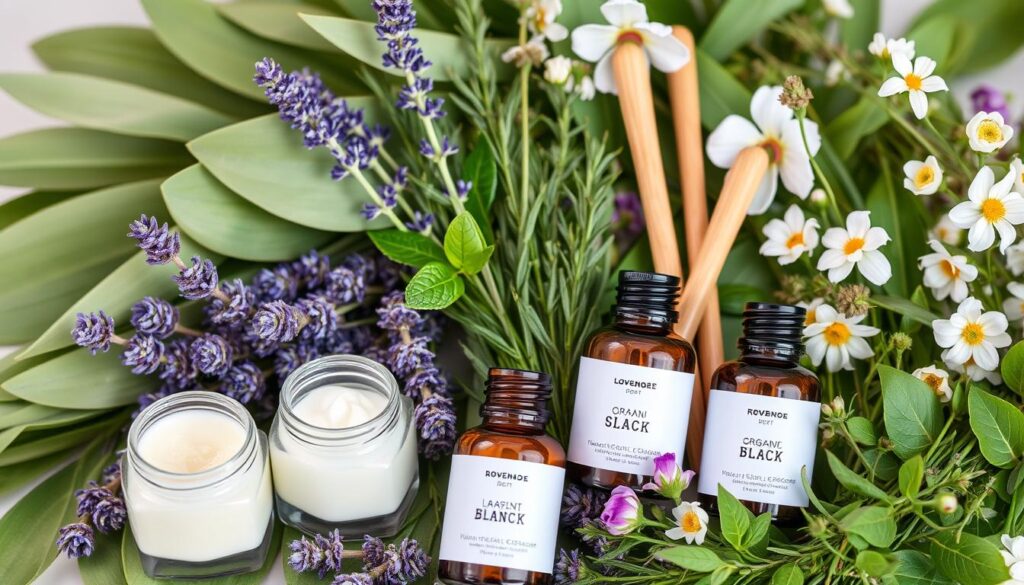
Trends in Organic Skincare
The demand for vegan skin care, cruelty-free cosmetics, and sustainable skincare brands is growing. The organic skincare industry is evolving to meet this demand. Let’s look at some key trends shaping the future of natural beauty.
Eco-Friendly Packaging
One big trend is eco-friendly packaging. Brands are moving to recyclable, biodegradable, and refillable options. This is to reduce their environmental impact. You’ll see more glass jars and aluminum tubes in stores.
Vegan and Cruelty-Free Options
There’s a big increase in vegan skin care and cruelty-free cosmetics. Brands are showing they care about animal welfare. They offer plant-based products that are effective and kind.
Innovations in Formulation
Organic skincare brands are getting creative. They use new technologies and ingredients. This means better products without harming the planet.
“The future of organic skincare is about more than just natural ingredients – it’s about sustainable innovation that enhances both the health of our skin and the health of our planet.”
As people care more about the planet and their health, the industry is responding. It’s bringing new vegan skin care, cruelty-free cosmetics, and sustainable skincare brands. These brands are changing the face of natural beauty.
How to Transition to Organic Skincare
Switching to organic skincare brands can greatly improve your skin and the planet. But, it’s important to plan carefully for a smooth transition. Here’s a simple guide to help you move towards natural beauty products and clean beauty.
Assessing Your Current Routine
Start by checking your current skincare routine. Look at the ingredients in your products. See if there are any bad ones like synthetic fragrances, parabens, or harsh chemicals. This will show you where to focus as you switch to organic skincare.
Gradually Introducing New Products
Don’t change everything at once. Start by adding organic skincare products one or two at a time. For example, begin with a new moisturizer or cleanser. This way, your skin can get used to the new stuff without any big problems.
Monitoring Your Skin’s Response
Watch how your skin reacts to the new organic skincare brands. Notice any changes in how it looks or feels. If you get irritation or breakouts, slow down or go back to what you were using before. Talking to a dermatologist can also be very helpful during this time.
By going slow and careful, you can make the switch to organic skincare smoothly. You’ll enjoy the perks of natural beauty products and clean beauty for your skin and the planet.
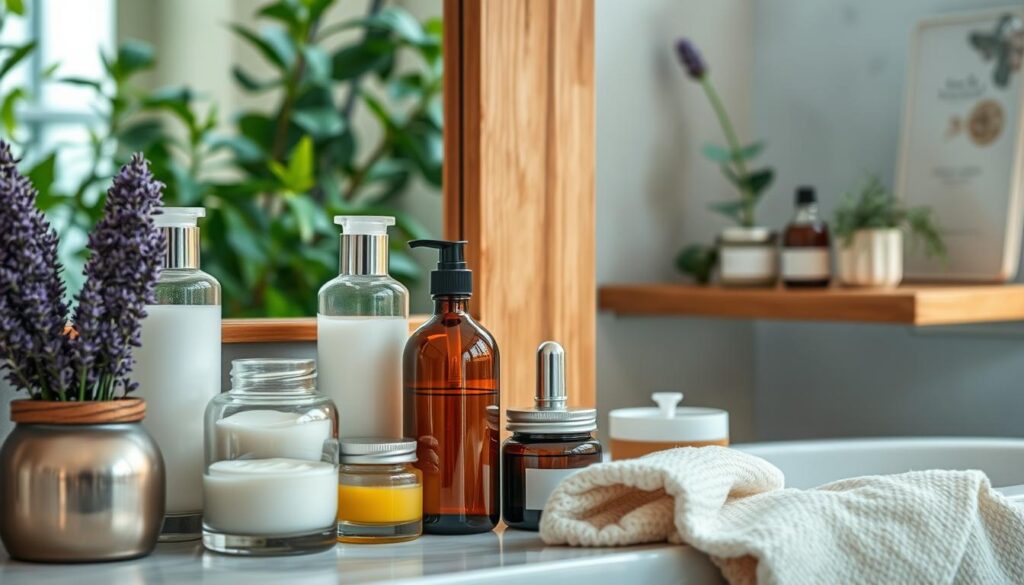
Conclusion: Embracing Organic Skincare
The beauty of natural beauty is growing, attracting both buyers and leaders. Organic skincare brands lead the way to a greener, kinder beauty world. These organic skincare brands and sustainable skincare are changing the beauty industry.
The Future of Natural Beauty
People now care more about what’s in their skincare and how it affects the planet. The need for green beauty is pushing the industry to be more creative. Brands are making new products, packaging, and finding better sources to meet today’s eco-friendly demands.
Final Thoughts on Your Skincare Journey
Starting your organic skincare journey is a chance to care for your skin and the planet. It’s about choosing brands that are good for you and the earth. Keep exploring and choosing wisely, knowing your choices can help create a better future.

